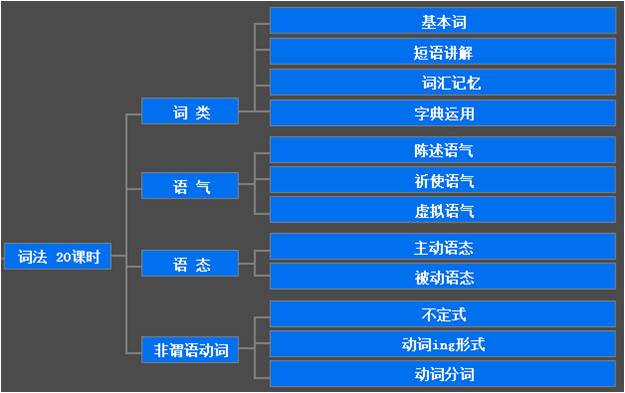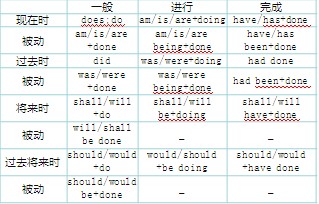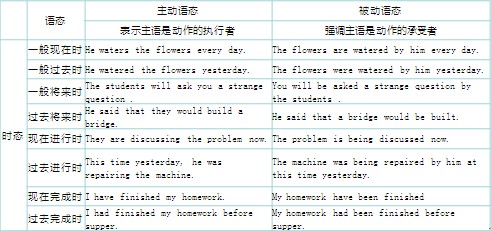专项密训词汇班课程设置

第二章 语态
一、 主动语态
二、 被动语态
第十六讲 主动语态和被动语态
语态课程内容
1、语态概述
2、两种语态区别
3、被动语态构成
4、语态转换
5、特殊被动语态结构
1、语态概述
英语动词有两种语态:主动语态和被动语态。
主动语态:主语是动作的执行者时,
动词用主动语态形式。
例如:We clean our classroom every day.
被动语态:主语是动作的承受者时,
动词则用被动语态形式。
例如:The room is cleaned by Jim.
2、两种语态区别
主动语态与被动语态的区别:
在主动语态中,主语是谓语动词的使动方。
在被动语态中,主语是谓语动词的受动方。
在语法结构上,主动语态和被动语态的区别主要在于,主动语态直接使用动词原形作为谓语,然后再在该动词原形的基础上施加时态和其他语法;
而被动语态则使用系词+动词的过去分词作为谓语,各种时态和其他语法也施加在系词上。
3、被动语态构成
被动语态构成:
助动词 be+及物动词的过去分词。
be 有各种人称和时态的变化。
The foreign guests were given a warm welcome by the children.
孩子们热烈地欢迎外宾。
He is regarded as brilliant by people. 人们认为他很有才华。
My shoes had been cleaned by somebody.
有人早已把我的鞋子擦了。
4、语态转换
主动语态变被动语态的方法:
1)把主动语态的宾语变为被动语态的主语。
2)把主动语态的谓语动词变为被动语态的谓语动词结构。
3)把主动语态的主语变为被动语态介词 by 的宾语。
4)主动语态变为被动语态时,时态不变。
5)动词要和主语一致。
Note:当动作的执行者不必说明或者没有必要强调时,
by 短语可省略。
They grow tea in Southeast China.
Tea is grown in Southeast China.
She often takes care of the baby.
The baby is often taken care of by her.
The boys played football last Sunday.
Football was played by the boys last Sunday.
The workers will build some new roads next year.
Some new roads will be built by the workers next year.
4、语态转换

4、语态转换

5、特殊被动语态结构
1)带情态动词的被动结构:
The problem must be solved soon.
主动语态 We must plant more trees
被动语态 More trees must be planted.
2)带不定式的被动结构:
The homework needs to be done with care.
主动语态中有些动词如:make, see, listen, watch, feel后常跟不带to的动词不定式作宾语补足语,
变为被动语态要带上to
He made the boy work for him.
→The boy was made to work for him.
3)短语动词的被动结构:
The room is going to be painted.
短语动词的被动结构有经下几种:
(1)(不及物)动词+介词:若这类短语动词是及物性的,则可用于被动语态,如:laugh at, look after, talk about, think of 等。若这类这类短语动词是及物性的,则可用被动语态。
5、特殊被动语态结构
(2)(及物)动词+副词:bring about, carry out, find out, make out等。
(3)动词+副词+介词:do away with, face up to, give in to, look down upon, make up for等。
(4)动词+名词+介词:catch sight of, keep an eyes on, make a fool of,等。
4)主动语态中若有双宾语,变为被动语态时,
有下列二种情况
主动语态 My father bought me a new watch.
被动语态 I was bought a new watch by my father.
(表示人的间接宾语做主语)
=A new watch was bought for me by my father.
(表示物的直接宾语做主语)
表示物的直接宾语做被动语态的主语时,
要在表示人的间接宾语前加介词for或 to
加to的情况 give, pass, show
加for的情况 buy, mend
5)带复合宾语的动词在改为动语态时,一般把主动结构中的宾语改成主语,宾语补足语保留在谓语后面。
例如:We always keep the classroom clean.
The classroom is always kept clean.
6)主动形式表示被动意义的词。常见的有:
(1)动词后用动名词的主动形式,这时动名词句中的主语有动宾关系。
例如:This point deserves mentioning.
The window requires repairing.
(2)有些及物动词后须加副词(如well, easily等),有些不可加,如act, clean, cut, draw, lock, open, play, read, sell, shut, strike, wash, write等
例如:The clothes washes/sells well.
The play won’t act.
(3)形容词后直接加动词。
例如:The book is worth reading twice.
(4)某些作表语的形容词后,用不定式主动形式表示被动意义。
例如:The fish is not fit to eat.
(5)某些感官动词的形式和系动词(如feel, look, prove, smell, sound, taste, 等)与形容词连用时。
如:The water feels very cold. 这水摸上去很冷。
7) 被动形式表示主动意义
be pleased, be graduated (from), be finished,
get married
He is graduated from a famous university.
表示同某人结婚,用marry sb. 或get married to sb. 都可。
He married a rich girl.=He got married to a rich girl.
8)以下动词构成的句子不能改为被动句;
(1)动词leave, enter, reach 等的宾语是表示处所、地点(国家、团体、组织、军队)等。
(2)表示动态的动词,如become, benefit, cost, contain, equal, fit, fail, have, lack, last, mean, suit, look like等。
5、特殊被动语态结构
(3)下例不及物动词及短语动词:appear, belong to, break out, die, happen, lie, occur, rise, take place, agree with, belong to, consist of, have on, keep up with 及一些固定词组,如keep word, lose heart, make a face等。
(4)宾语是反身代词、相互代词、同源宾语、不定式、动名词、抽象名词等。
9)汉语有一类句子不出现主语,在英语中一般可用被动结构表示.例如:
有人相信……It is believed that…
大家认为…….It is generally considered that…
众所周知……..It is well known that…
必须指出……..It must be pointed out that…
据推测说…….It is supposed that…
希望……… It is hoped that…
据说……. It is said that…
有人会说……It will be said that…
练习
1.They asked me to come a little later.
→I ___ _______ to come a little later.
2.Women often talk about food and clothes.
→Food and clothes ____ often _____ about by women.
3.Do they make this kind of truck in Shanghai?
→ ___this kind of truck _____ in Shanghai?
4.We must clean our teeth twice a day.
→Our teeth must ___ ____ twice a day.
5.Can I answer this question in Chinese?
→_____this question __ ______ in Chinese?
6. You must not put the bike there.
→ The bike ___ ____ _____there.
答案:
1.was asked 2.are talked 3.Is made
4.be cleaned 5.Can be answered 6.mustn't be put